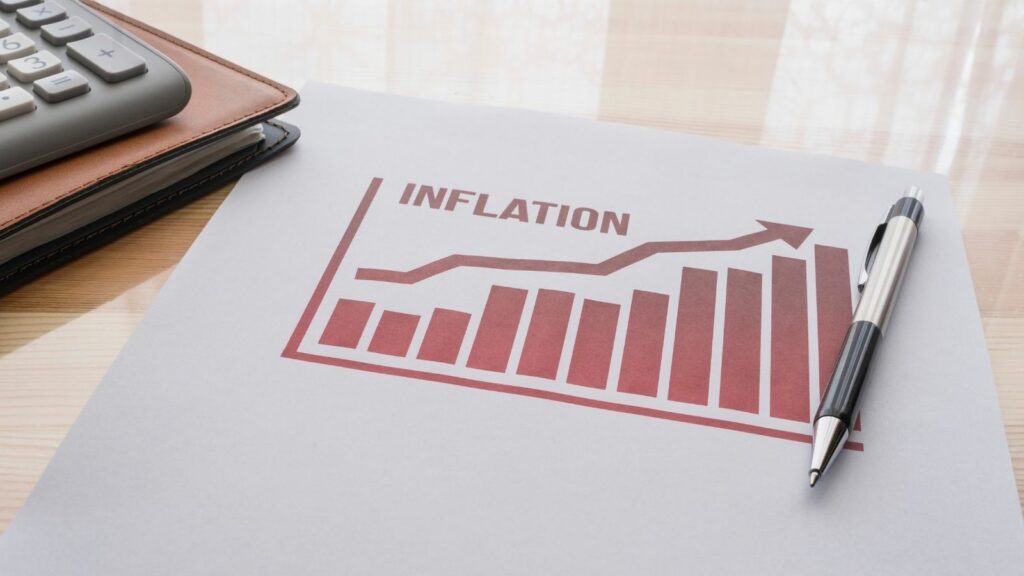Inflation, the steady increase in prices over time, is a significant factor that can significantly impact your retirement savings. As prices rise, your purchasing power decreases, meaning your savings won’t go as far as you might expect. We look at 20 ways inflation is affecting retirement planning:
Eroding Purchasing Power

The most immediate effect of inflation is the erosion of purchasing power. As prices for goods and services increase, the same amount of money buys less, which means retirees need to stretch their savings further, often reducing their quality of life or changing their retirement plans.
Rising Healthcare Costs

Healthcare expenses, already a significant concern for retirees, are growing even more rapidly due to inflation. It’s critical to budget for increased healthcare costs during retirement because medical costs, insurance premiums and out-of-pocket spending are all rising.
Increasing Longevity Risk

As inflation impacts savings, retirees face a higher risk of outliving their money. The possibility of living longer than expected becomes more pronounced when inflation reduces the value of a retirement nest egg. It’s important to plan for longer retirements while accounting for rising costs, especially if you retire earlier and are in good health.
Social Security Adjustments

Social Security offers cost-of-living adjustments (COLAs) to help counter inflation, but these increases may not fully cover the actual rise in living expenses. Many retirees find themselves falling short of their financial objectives even with Social Security, which means they have to rely more on their own funds.
Lower Fixed-Income Returns

Many retirees rely on fixed-income investments, such as bonds, to generate stable returns. However, inflation reduces the real value of these returns. As interest rates remain relatively low, retirees may struggle to find investments that keep pace with inflation.
Shifting Investment Strategies

With inflation affecting traditional fixed-income investments, retirees are shifting their strategies to focus on equities, real estate and other assets that may offer better protection against rising prices. But, these investments are volatile and often come with increased risk, which may not suit all retirees who prefer a more stable retirement.
Pension Plan Challenges

Defined benefit pension plans that offer fixed monthly payments may not account for inflation, leaving retirees with stagnant incomes while prices rise. If your pension does not include inflation adjustments, the purchasing power of your benefits will gradually decrease over time.
Delaying Retirement

Many individuals are now considering delaying retirement to save more money and reduce the number of years they’ll need to rely on their savings. Retirees concerned about their finances can increase their contributions and Social Security benefits by working longer.
Increased Demand for Part-Time Work

As inflation squeezes retirement budgets, more retirees are seeking part-time work to supplement their income. This trend is especially common among those who retired early or those whose savings have been significantly affected by inflationary pressures.
Higher Costs of Downsizing

Downsizing has long been a strategy for retirees to reduce living expenses. But, the housing market’s inflation-driven surge in prices means that selling a larger home and buying a smaller one may not yield the financial savings retirees once expected.
Rethinking Retirement Locations

Inflation is prompting many retirees to rethink where they plan to live during retirement. High-cost areas may no longer be affordable, leading individuals to explore lower-cost domestic or international destinations that offer a more budget-friendly retirement lifestyle.
Increased Importance of Inflation-Protected Securities

TIPS, or Treasury Inflation-Protected Securities, have become increasingly popular as investors worry about rising prices and the loss of their purchasing power. The principal value of a TIPS adjusts based on changes in the Consumer Price Index (CPI), which is a measure of inflation.
Rising Insurance Premiums

Insurance costs, including health, life and long-term care insurance, are also increasing due to inflation. Retirees need to plan for higher premiums, which can consume a larger portion of their retirement income than originally anticipated.
Declining Value of Cash Savings

Holding large amounts of cash in savings accounts can be detrimental during periods of inflation, as the real value of cash declines over time. Retirees are increasingly advised to diversify their assets into investments that offer some inflation protection, rather than relying on cash.
The Impact on Estate Planning

Inflation can affect estate planning in surprising ways. As the value of assets fluctuates, retirees may need to reassess their wills, trusts and inheritance strategies to ensure their estates can cover taxes, healthcare and other end-of-life expenses.
Changing Long-Term Care Strategies

With inflation driving up the cost of long-term care services, many retirees are reevaluating their long-term care strategies.The cost of nursing homes, assisted living, and home healthcare is on the rise. Retirees may need to allocate more of their savings to cover these expenses.
Reducing Lifestyle Expectations

Many retirees are finding that they need to adjust their expectations for their retirement lifestyle. From cutting back on travel and entertainment to downsizing further than planned, inflation is forcing retirees to make difficult choices about how they spend their money.
Tax Implications of Inflation

Inflation can also have tax implications for retirees. As income thresholds for tax brackets and deductions lag behind inflation, retirees may find themselves paying more in taxes on their Social Security benefits, pensions and investment income, further eroding their disposable income.
The Impact on Employer-Sponsored Retirement Plans

Inflation is also reshaping the way employers manage retirement plans. Some firms are struggling with increased costs, so they are cutting back on benefits or matching payments. Employees may find it more difficult to accumulate enough money for retirement as a result.
The Need for Continuous Financial Reassessment

Inflation really highlights the need to consistently review retirement plans as retirees should regularly reassess their strategies and investments. This will ensure retirees are aware of how their finances are doing at every stage of retirement, potentially mitigating any disasters.
18 Reasons Why People Are Leaving Florida in Masses

Exploring factors that impact the desirability of living in Florida, this list delves into various challenges shaping residents’ experiences. From environmental concerns like rising sea levels to economic factors such as fluctuating job markets, these issues collectively contribute to a nuanced understanding of the state’s appeal.
18 Reasons Why People Are Leaving Florida in Masses
